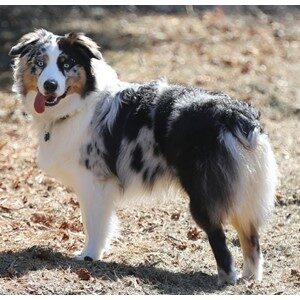Best Dog Beds for Australian Shepherd
Consider Orthopedic Beds for This Breed!
Introduction
Best dog beds for Australian Shepherd are those that provide adequate support, especially for their joints and sleeping preferences. Orthopedic beds are best.
They are loyal and affectionate companions, forming strong bonds with their families while displaying a natural wariness towards strangers, making them both attentive watchdogs and loving family pets.
With proper training, socialization, and plenty of mental and physical stimulation, Australian Shepherds thrive in environments where their intellect and athleticism are engaged.
In this article we will provide information about this dog breed for potential dog owners. Which will include health issues, costs of ownership, facts about the Australian Shepherds, and the best dog beds for them.
Best Dog Beds
When considering the best dog bed for Australian Shepherds, it’s important to consider their size, activity level, sleeping position, preferences, and comfort needs. Here are some factors to keep in mind when choosing a dog bed for this breed:
- Size: Australian Shepherds are medium-sized dogs, typically ranging from 18 to 23 inches in height and weighing between 40 to 65 pounds. Ensure the bed is large enough for them to stretch out comfortably.
- Durability: Aussies are active dogs with moderate to high energy levels. Choose a dog bed made from durable materials that can withstand their movement and occasional scratching.
- Support: Look for a dog bed that provides good support for their joints, especially if your Australian Shepherd is older or prone to joint issues like hip dysplasia. Memory foam or orthopedic beds can be a beneficial option.
- Easy to Clean: Opt for a dog bed with a removable, machine-washable cover for easy cleaning. This is especially important given that Australian Shepherds can shed moderately.
- Waterproof or Resistant: Consider a bed with a waterproof or water-resistant liner, particularly if your Aussie enjoys outdoor activities or tends to get wet and muddy.
- Comfort: Australian Shepherds appreciate a cozy place to relax after a day of activity. Beds with plush padding or soft materials can provide comfort and warmth.
- Chew Resistance: While adult Australian Shepherds typically aren’t heavy chewers, puppies may chew on their beds. Choose a bed with sturdy construction and reinforced seams to withstand occasional chewing.
- Versatility: Some Australian Shepherds enjoy nesting or burrowing. Beds with raised sides or bolsters can provide a sense of security and comfort for these dogs.
- Look for the CertiPURUS Seal: When buying any orthopedic dog bed, look for the CertiPUR-US seal. The seal means that the materials used in making the dog bed does not contain any harmful chemicals or toxins that are bad for humans and pets.
Based on these considerations, a good recommendation for an Australian Shepherd might be a large-sized orthopedic dog bed with a removable, washable cover.
Beds with memory foam or supportive padding are excellent for joint health, especially as the dog ages. Look for brands known for durability and comfort and consider your dog’s specific habits and preferences when making your choice.
Best Dog Bed Brands
We have listed some reputable dog bed brands that are well-reviewed, durable, and offer good value for dog owners. Here are some reputable dog bed brands that are often recommended:
- Big Barker: Known for their orthopedic dog beds, Big Barker offers beds specifically designed to support large and medium-sized dogs, including options with therapeutic foam for joint support.
- Kuranda: Kuranda dog beds are popular for their elevated design, which helps keep dogs cool and comfortable. They are durable and easy to clean, making them suitable for active breeds like Australian Shepherds.
- Orvis: Orvis offers a range of high-quality dog beds, including memory foam beds and bolster beds. Their beds are known for their durability, comfort, and stylish designs.
- BuddyRest: BuddyRest specializes in orthopedic dog beds with features such as memory foam and gel-infused foam for joint support and cooling. They are designed to withstand heavy use and are easy to clean.
- PetFusion: PetFusion makes orthopedic dog beds with memory foam and supportive bolsters. Their beds are often praised for their comfort, durability, and value.
- FurHaven: FurHaven offers a variety of affordable dog beds, including orthopedic foam beds, bolster beds, and cooling beds. They provide options for different preferences and budgets.
- Majestic Pet: Majestic Pet offers a range of dog beds including orthopedic beds, bolster beds, and outdoor beds. They are known for their durability and variety of sizes.
- Snoozer: Snoozer specializes in cozy and comfortable dog beds with options like orthopedic beds, cave beds, and bolster beds. They focus on providing comfort and support.
Highlighting features like orthopedic support, washable covers, and durability against chewing or scratching can appeal to potential buyers looking for a bed that will last and provide comfort, support and relieving aching joints for their active dog.
Facts About Australian Shepherds
Here are some interesting facts about Australian Shepherds:
- Known As Aussie’s: The Australian Shepherd, affectionately known as the “Aussie,” is a versatile and intelligent breed originating not from Australia, but from the United States. Bred primarily for herding livestock, these medium-sized dogs are characterized by their agility, stamina, and keen intelligence.
- Striking Colors: Aussies are known for their striking coat colors and patterns, including blue merle, red merle, black, and red, often accompanied by white and tan markings.
- Beyond their herding instincts: Australian Shepherds excel in various dog sports and activities, thanks to their high energy levels and eagerness to learn.
- Popularity: This breed is the 12th most popular in the United States according to AKC.
Size
- Male Height: 20 – 23 inches
- Male Weight: 50 – 65 lbs.
- Male Length: 31 – 36 inches
- Female Height: 18 – 21 inches
- Female Weight: 40 – 55 lbs.
- Female Length: 28 – 31 inches
- Lifespan: 12 – 15 years
- Coat Colors: Black, red merle, red tricolor, merle, red, black tricolor, blue merle
- Popularity: This is the 12th most popular dog breed in America according to AKC.
More Facts:
- Not from Australia: Despite their name, Australian Shepherds were not developed in Australia. They were actually bred in the United States in the 19th century to work as herding dogs.
- Versatile Working Dogs: Australian Shepherds are renowned for their versatility. They excel not only in herding livestock but also in various dog sports such as agility, obedience, flyball, and even search and rescue.
- Unique Coat Colors: One distinctive feature of Australian Shepherds is their coat colors and patterns. They come in several variations including blue merle, red merle, black, and red, often with white markings and possibly tan points.
- Different Eye Colors: Many Australian Shepherds have striking eyes that can be two different colors, or “marbled” within the same eye. This trait is known as heterochromia.
- High Energy Levels: Aussies are known for their high energy levels and need plenty of exercise and mental stimulation to thrive. They are not typically couch potatoes and enjoy being active and engaged.
- Intelligence: Australian Shepherds are highly intelligent dogs and are known for their problem-solving abilities. They are quick learners and excel in training and learning new commands.
- Herding Instinct: Even if they are not actively herding livestock, Australian Shepherds may exhibit herding behaviors with children, other pets, or even objects. They may try to “herd” their family members by circling or nipping at their heels.
- Loyal and Protective: Aussies are known for their loyalty to their families and can be protective of their loved ones. They are often wary of strangers but are typically not aggressive without provocation.
- Size Variations: Australian Shepherds come in different sizes, ranging from standard to miniature. Miniature Australian Shepherds are smaller versions bred selectively from the standard Aussies.
- Celebrity Status: Australian Shepherds have been featured in movies, TV shows, and advertisements due to their striking appearance and intelligence. They have gained popularity as both working dogs and beloved companions.
- Referred To As An Aussie: The Australian Shepherd, often referred to as an “Aussie,” is a highly intelligent and energetic dog breed known for its herding abilities and striking appearance.
- Origin: Despite their name, Australian Shepherds were actually developed in the United States in the 19th They were originally bred to work as herding dogs on ranches and farms.
- Temperament: Australian Shepherds are known for their intelligence, loyalty, and high energy levels. They are eager to please and excel in obedience training and agility. Aussies are also affectionate with their families but can be reserved or wary around strangers, making them good watchdogs.
- Activity Needs: Due to their herding background, Australian Shepherds require regular exercise and mental stimulation to prevent boredom, separation anxiety and destructive behavior. They thrive in environments where they have space to run and play, making them well-suited for active families or those involved in dog sports. They are not suited for apartment owners.
- Health Considerations: Like all breeds, Australian Shepherds are prone to certain health issues such as hip dysplasia, epilepsy, and eye problems (especially in merle-colored dogs). Responsible breeding practices and regular veterinary check-ups can help mitigate these risks.
- Grooming: Their coat requires regular brushing to prevent matting and keep shedding under control, especially during the shedding seasons.
- Suitability: The Australian Shepherds are best suited for active owners who can provide them with plenty of exercise, mental stimulation, and attention, They are adaptable dogs but thrive best in environments where they can participate in activities that engage their intelligence and energy.
Overall, Australian Shepherds are loving companions with a strong work ethic and a zest for life, making them a popular choice for both working roles and family pets. These facts highlight the unique characteristics and qualities that make Australian Shepherds such a beloved and admired breed among dog enthusiasts.
Health Concerns
Like all breeds, Australian Shepherds are prone to certain health issues. Being aware of these conditions can help you provide proper care and timely veterinary attention when needed. Here are some common health issues associated with Australian Shepherds:
- Hip Dysplasia: This is a common orthopedic condition where the hip joint doesn’t fit together properly, leading to discomfort, lameness, and arthritis. It can be influenced by genetics and environmental factors.
- Hypothyroidism: This disease is common in Australian Shepherds and is called underactive thyroid. This is where the thyroid does not produce enough thyroxine which can cause weight gain, coldness, dry flaky skin, lethargy and loss of fur.
- Multi Drug Resistance (MRD1): There are a few breeds that suffer from this disease. The Australian Shepherds do suffer from this condition. These dogs will experience adverse effects from commonly used drugs which includes heartworm medication. Care must be taken when given your dog any medication as the effects can be dangerous.
- Elbow Dysplasia: Similar to hip dysplasia, elbow dysplasia involves abnormal development of the elbow joint, leading to pain, lameness, and arthritis.
- Progressive Retinal Atrophy (PRA): PRA is a group of genetic diseases that cause the gradual deterioration of the retina, eventually leading to blindness. Testing breeding dogs for PRA can help reduce its prevalence.
- Cataracts: Australian Shepherds can develop cataracts, which are opacities in the lens of the eye that can impair vision. Regular eye exams can help detect and monitor cataracts.
- Collie Eye Anomaly (CEA): CEA is an inherited eye condition that affects the development of the eye, including the retina and optic nerve. It can vary in severity and may lead to vision impairment.
- Epilepsy: Some Australian Shepherds may be prone to epilepsy, a neurological disorder characterized by seizures. Medication and management can help control seizures in affected dogs.
- Allergies: Aussies can be prone to allergies, including food allergies and environmental allergies (such as pollen or dust). Allergic reactions may manifest as skin irritation, itching, or gastrointestinal upset.
- Autoimmune Disorders: Certain autoimmune conditions, such as autoimmune thyroiditis or lupus, may occur in Australian Shepherds. These conditions can affect various systems in the body and require veterinary management.
- Dental Issues: Like many breeds, Australian Shepherds can be prone to dental problems such as periodontal disease and tooth decay. Regular dental care, including brushing teeth and veterinary cleanings, can help maintain oral health.
- Obesity: Due to their high energy levels, Australian Shepherds require adequate exercise and a balanced diet to prevent obesity. Obesity can contribute to other health issues such as joint problems and heart disease. Be sure to control their food intake and the dog treats do not exceed more than 10% of their daily caloric intake.
It’s important to work closely with a veterinarian who is familiar with Australian Shepherds to monitor their health, address any concerns promptly, and maintain preventive care such as vaccinations, parasite control, and regular check-ups.
Costs of Ownership
The cost of owning an Australian Shepherd can vary depending on various factors such as where you live, the quality of care you provide, and any unexpected medical expenses. Here is a breakdown of the typical costs associated with owning an Australian Shepherd:
- Initial Purchase Price: The price of purchasing an Australian Shepherd puppy from a reputable breeder can range from $600 to $2,000 or more, depending on factors such as the breeder’s reputation, the pedigree of the puppy, and location.
- Food: Expect to spend approximately $40 to $60 per month on high-quality dog food for an Australian Shepherd. The cost can vary based on the brand, size of the dog, and dietary needs.
- Veterinary Care: Annual veterinary expenses for an Australian Shepherd, including vaccinations, routine check-ups, and preventive medications (e.g., flea and tick prevention), typically range from $200 to $600 or more depending on the area and specific veterinary clinic.
- Training and Socialization: Australian Shepherds benefit from obedience training and socialization, which can vary in cost. Puppy classes and basic obedience training might range from $100 to $300 or more depending on the trainer and location.
- Grooming: Aussies have a moderate grooming requirement. Regular grooming supplies (brushes, shampoo, etc.) may cost around $50 to $100 Occasional professional grooming sessions, if desired, can add another $50 to $100 per session.
- Toys and Accessories: Budget for toys, bedding, collars, leashes, and other accessories, which may cost around $100 to $300 initially, with ongoing replacement as needed.
- Healthcare Costs: While you hope not to encounter major health issues, it’s prudent to budget for unexpected veterinary expenses. These can range from a few hundred to several thousand dollars depending on the severity of the condition and required treatment.
- Insurance: Pet insurance is optional but can provide financial protection against unexpected veterinary bills. Premiums typically range from $30 to $50 per month depending on coverage options and the dog’s age and health status.
- Exercise and Enrichment: Australian Shepherds are active dogs and require mental stimulation and exercise. Budget for activities like dog sports, toys, and possibly dog daycare or dog walker services if you have a busy schedule.
- Miscellaneous Expenses: Include costs for licensing, microchipping, and potentially boarding or pet sitting if you travel.
In summary, the annual cost of owning an Australian Shepherd can range from approximately $1,000 to $3,000 or more, depending on the individual dog’s needs and your lifestyle. Proper care, preventive health measures, and early training can contribute to a happy and healthy life for your Australian Shepherd.
Safe Foods To Feed Your Dog
Below is a list of foods which are safe for your dog to eat. You can use them as treats or just add some of them into his kibble for a change of pace meal.
- Blueberries
- Carrots
- Bananas
- Apples
- Unsalted Cashews
- Cauliflower
- Unseasoned Cooked Chicken (Remove all bones and skin)
- Unseasoned Cooked Eggs
- Cooked and Unseasoned Fish
- Green Beans
- Peanuts and Peanut Butter
- Pumpkin
- Cooked White Rice
- Cooked and Unseasoned Turkey (Remove all bones and skin)
- Watermelon
- Plain Yogurt
Foods To Avoid
Just as some foods are ok to give to your dog, there are also some that are bad. Table scrapes, and other foods can be dangerous to dogs. Below is a list of foods you should avoid giving your dog:
- Alcohol
- Almonds
- Avocado
- Caffeine
- Cat Food
- Chicken and Turkey Skin & Ham
- Chives
- Chocolate (White or Dark)
- Cooked Bones
- Garlic
- Grapes & Raisins
- Liver
- Macadamia Nuts
- Mushrooms
- Nutmeg & Cinnamon
- Onions
- Raw Eggs
- Raw Potatoes & Sweet Potatoes
- Spinach
- Xylitol Sweetener in any form
- Yeast, & Raw Dough
If your dog should ingest any of these foods, you should contact your vet as some of them are very toxic and can cause death to your pet.
Conclusion
If you are considering owning one of these dog breeds, you have been informed of what is expected of you. We shared the costs of ownership, health issues, facts, best dog beds and foods to avoid giving your dog.
If you have a very active family, then owning this dog breed is right for you.
The Australian Shepherds requires lots of exercise and mental stimulation. You will need to ensure that they are socialized so they will be friendly to your family and friends.
Failure to provide sufficient exercise will result in them developing separation anxiety which will result in them damaging your belongings and other things in the house.
If you cannot provide them with a minimum of 1-hour exercise every day, you may want to consider another dog breed. Also, if you live in an apartment this dog is not for you.
We provided a list of save foods to give your as well as a list of foods to avoid. If you are an active person, and has the time for their training, that likes to hike, camp, and do other activities, this dog breed is for you.
When placing the dog bed in your house, be sure it is out of the way of heavy traffic and drafty areas.
You can read about our other dog breed information articles by clicking HERE!
Shop Dog Beds
Shop dog beds for your dog by selecting or clicking on any bed of choice. You will be taken to Amazon where you can read customer reviews and answered questions and place the order.
As an Amazon Associate, I earn from qualifying purchases. Your purchase price is the same as if you shop directly on Amazon.
The price at time of publish is included below to give you an idea of what the price is; however, it is subject to change.
Shop Rectangle Dog Beds
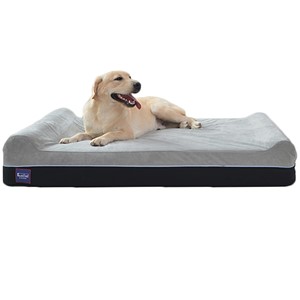
Laifug Large Grey Orthopedic Rectangle Bed
Price At Time of Publish $130.00
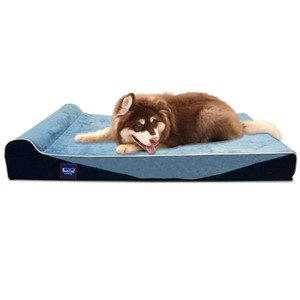
Laifug Large Blue Orthopedic Rectangle Bed
Price At Time of Publish $130.00 $110.00
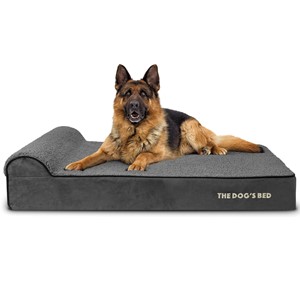
The Dogs Bed XL Grey Orthopedic Rectangle Bed
Price At Time of Publish $130.00 $185.00
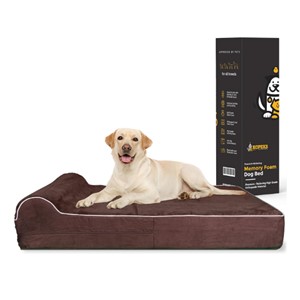
KOPEKS Jumbo Orthopedic Rectangular Bed
Price At Time of Publish $130.00 $110.00
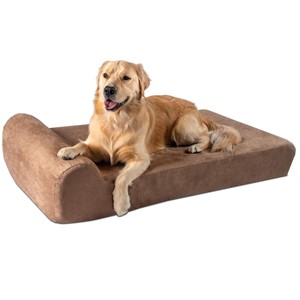
Big Barker XL Orthopedic Rectangle Bed
Price At Time of Publish $130.00 $240.00
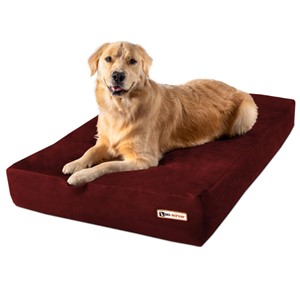
Big Barker XL Burgundy Orthopedic Rectangle Bed
Price At Time of Publish $130.00 $200.00
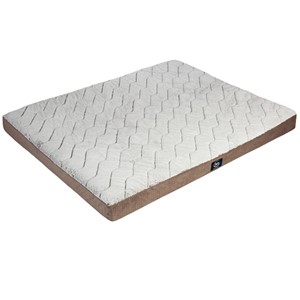
Serta XL Brown Orthopedic Rectangle Bed
Price At Time of Publish $130.00 $80.00
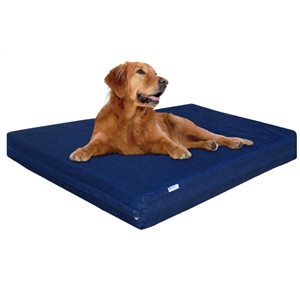
DogBed4Less XL Blue Orthopedic Rectangle Bed
Price At Time of Publish $130.00 $80.00
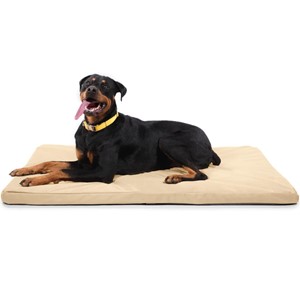
K9 Ballistics XL Sandstone Orthopedic Crate Pad
Price At Time of Publish $130.00 $159.00
Shop Bolster Dog Beds
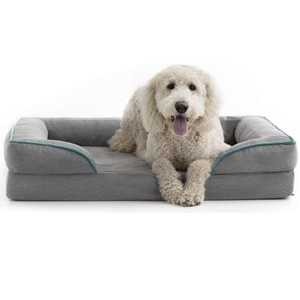
Brindle XL Gray Orthopedic Bolster Bed
Price At Time of Publish $130.00 $79.00
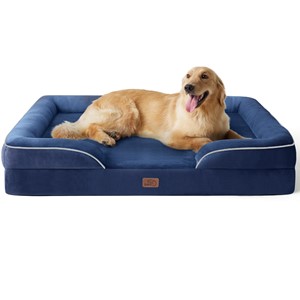
Bedsure XL Blue Orthopedic Bolster Bed
Price At Time of Publish $130.00 $76.00
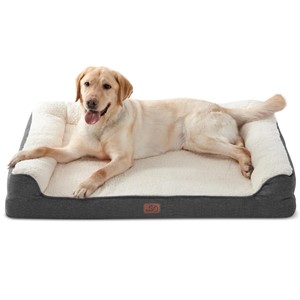
Bedsure XL Grey Orthopedic Bolster Bed
Price At Time of Publish $130.00 $60.00
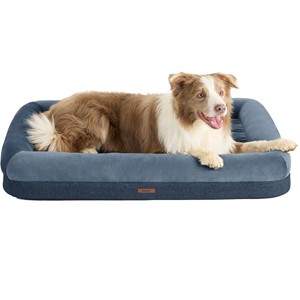
Lesure XL Navy Orthopedic Bolster Bed
Price At Time of Publish $130.00 $40.00
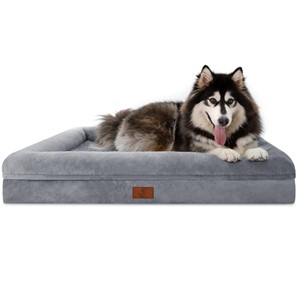
Yiruka XL Grey Orthopedic Bolster Bed
Price At Time of Publish $130.00 $55.00
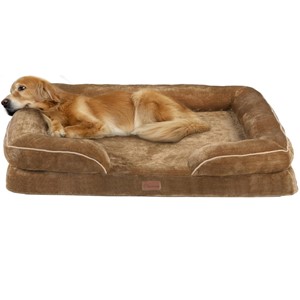
Yitahome XL Brown Orthopedic Bolster Bed
Price At Time of Publish $130.00 $37.00
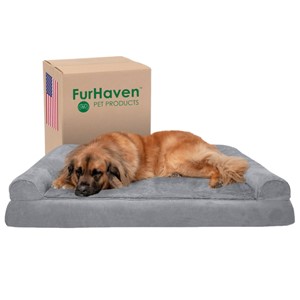
Furhaven XL Gray Orthopedic Bolster Bed
Price At Time of Publish $130.00 $130.00
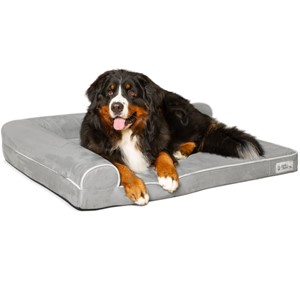
PetFusion XL Grey Orthopedic Bolster Bed
Price At Time of Publish $130.00 $60.00
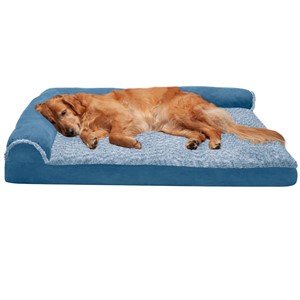
Furhaven Jumbo Blue Orthopedic Bolster Bed
Price At Time of Publish $130.00 $60.00
Shop Elevated Dog Beds
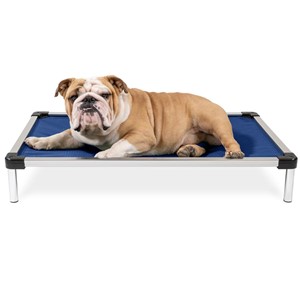
K9 Ballistics Chew Proof Elevated Small Bed
Price At Time of Publish $130.00 $129.00
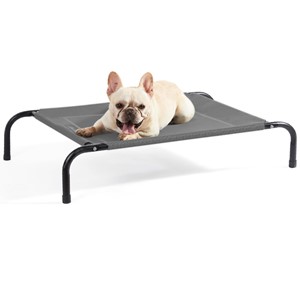
Bedsure Medium Elevated Dog Bed
Price At Time of Publish $130.00 $33.00
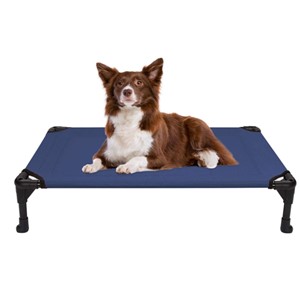
Veehoo Medium Elevated Dog Bed
Price At Time of Publish $130.00 $45.00
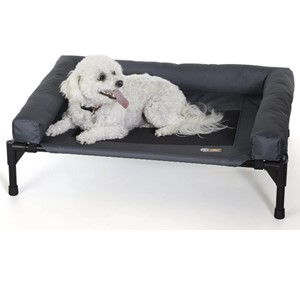
K&H Pet Products Elevated Bolster Dog Bed
Price At Time of Publish $130.00 $57.00
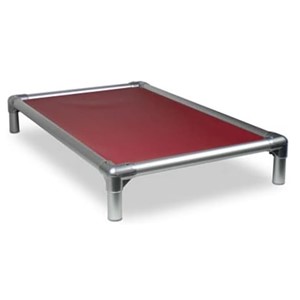
Kuranda Elevated Chew Proof Small Dog Bed
Price At Time of Publish $130.00 $134.00
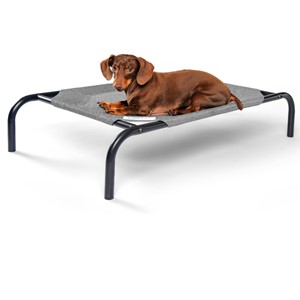
Coolaroo Small Elevated Dog Bed
Price At Time of Publish $130.00 $21.00
Related Articles
Below are some related articles that you might be interested in looking at. Just select or click on the link of interest to learn more about it.
- Are Crates Bad for Dogs
- Best Healthy Dog Food Brands
- Christmas Presents for My Dog
- Dog Parasite Symptoms
- How To Clean Dog Beds
- Ingredients To Avoid In Dog Treats
- Puppy Proofing Your House
- Signs Your Dog Is Ill
- Using Alexa for Dog Behaviors
- When Should A Dog Bed Be Replaced
Go back to the Dog Luxury Beds home page.
